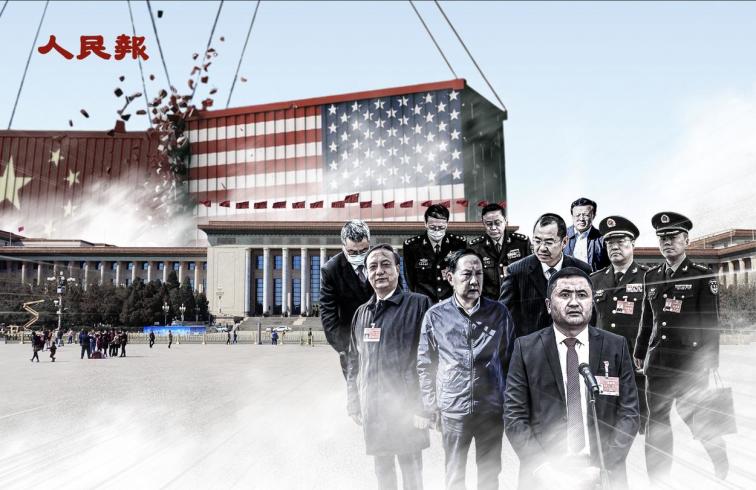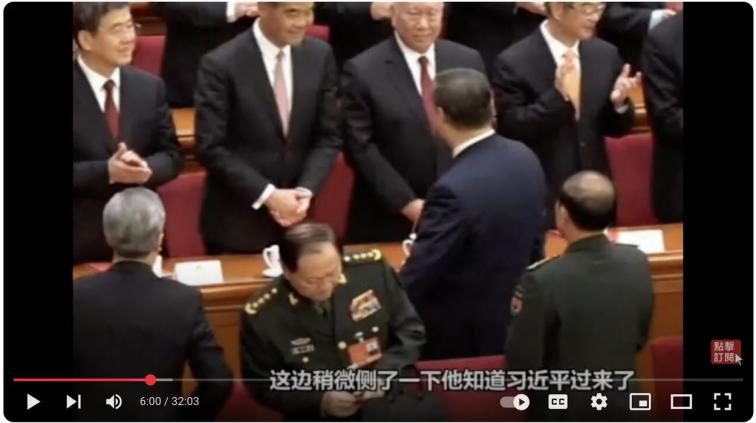Xi Jinping. (People News)
[People News] The Fourth Plenary Session of the Central Committee of the Communist Party of China has concluded, and the outcomes did not match the external leaks and various speculations that suggested Xi would resign from his roles as Chairman of the Central Military Commission and General Secretary. Instead, Xi has retained all three titles. Particularly over the past year, numerous signs indicated that he had lost military power; however, he still holds the title of Chairman of the Military Commission. This situation likely stems from either the Communist Party's need to maintain its authority or the intense factional struggles within the Party, where all sides have leverage over one another, resulting in a temporary compromise.
Even though Xi has kept the title of Chairman of the Military Commission, this does not imply that he has regained control over military power.
First, let’s highlight two notable points regarding the military at the plenary session. One point is that among the more than 40 Central Committee members and alternate members, only 27 were present. The most probable reason for the absence is that they may have encountered issues and are currently under investigation.
Secondly, after He Weidong and Miao Hua were confirmed to be expelled from the Party, no new members were appointed to the Central Military Commission. Only Zhang Shengmin, a member of the Military Commission and Secretary of the Military Discipline Commission, was promoted to Vice Chairman of the Military Commission, likely taking over He Weidong's role. This latter point reflects the unusual internal power struggles within the Communist Party.
As the Secretary of the Military Discipline Commission of the Communist Party, Zhang Shengmin has a close relationship with Zhang Youxia, the First Vice Chairman of the Military Commission. Over the past year, with the backing of Party elders, Zhang has consolidated military power and played a crucial role in purging Xi's influence within the military, acting as a key figure in addressing Xi's close associates, including He Weidong and Miao Hua, among many generals.
In this context, how could Xi Jinping, who nominally remains the Chairman of the Central Military Commission, not harbour a deep-seated animosity towards him? According to protocol, the Vice Chairman of the Military Commission should be nominated by Xi. Given Xi's intense dislike for Zhang Shengmin, it seems unlikely that he would agree to Zhang's promotion as Vice Chairman. Perhaps Xi would prefer Minister of Defence Dong Jun to take on this role, even though Dong is not yet a member of the Military Commission. While we do not know who made the nomination during the Fourth Plenary Session, the communiqué revealed that Zhang Shengmin successfully ascended to the position of Vice Chairman of the Military Commission, while Zhang Youxia effectively sidelined Xi as Chairman. Additionally, Dong Jun did not join the Military Commission, suggesting that, whether he liked it or not, Xi had to consent to Zhang Shengmin's nomination to replace He Weidong. This may also represent one of the conditions for a temporary compromise between Xi and Zhang Youxia.
One might wonder, if both Vice Chairmen of the Military Commission are not aligned with Xi, can Xi, as Chairman, truly issue commands? This situation is reminiscent of Hu Jintao's experience, who was sidelined by the two Vice Chairmen Xu Caihou and Guo Boxiong, loyal to Jiang Zemin; now, it is Xi who finds himself in a similar predicament.
As a result of this temporary compromise, the People's Liberation Army Daily has superficially restored its 'loyalty' to 'Chairman Xi', reporting on the plenary session in line with the unified stance of the Central Committee of the Communist Party of China. On October 24, the military newspaper published a customary commentary congratulating the conclusion of the Fourth Plenary Session, titled 'Writing a More Brilliant Chapter of Chinese-style Modernisation'.
The format and language of the article are generally similar to the congratulatory pieces written after the conclusion of the Fifth Plenary Session of the 19th Central Committee of the Communist Party of China, which established the '14th Five-Year Plan' at the end of October 2020, though there are some slight differences.
In the second line of the third paragraph, it states, "The 'Suggestions' approved by the plenary session," followed by five consecutive sentences praising it. Only after this does it mention that this "fully reflects the unity and leadership of the Party Central Committee with Xi Jinping at its core... a new chapter." In the commentary article from October 2020, immediately after the phrase "The 'Suggestions' approved by the plenary session," it states, "fully reflects the Party Central Committee with Xi Jinping at its core planning for the future..." followed by seven sentences of praise.
Considering the strict regulations governing high-level reporting in the Chinese Communist Party media, this reversal of order is unlikely to be accidental; it appears to be intentional, suggesting a question about whether Xi's status remains as significant as it once was.
In the fourth paragraph, when discussing the so-called achievements of the Communist Party over the past five years, it asserts, "The most fundamental aspect is that Chairman Xi is at the helm," guided by "Xi Jinping Thought," and claims that "the 'Two Establishes' are the greatest certainty, the greatest confidence, and the greatest guarantee in overcoming all difficulties and obstacles." Such expressions of loyalty have become rare in the past year, and this seems to serve as evidence of Xi's control over the military.
However, in the October 2020 article, the description of Xi Jinping, who at that time had firmly grasped military power and was the sole authority, was: "This is the result of the strong leadership of the Party Central Committee with Xi Jinping at its core, the result of Xi Jinping comrade being the core of the Party Central Committee and the core of the entire Party steering the helm, and the result of Xi Jinping's Thought on Socialism with Chinese Characteristics for a New Era providing scientific guidance."
By comparing similar articles from five years apart, one can discern what military reports should look like if Xi truly held military power.
The author finds it somewhat peculiar that this year's military newspaper commentary articles, while discussing the so-called achievements of the Communist Party over the past five years, did not credit these to the 'Party Central Committee with Xi as the core,' but instead referred to 'Chairman Xi leading the helm.' Is this a typographical error or a deliberate choice? Since only the General Secretary of the Communist Party can steer the country, does the term 'Chairman Xi' refer to his role as 'President' or 'Chairman of the Central Military Commission'? Or is it suggesting something deeper?
After addressing past achievements, the commentary naturally shifts to the planning for the '14th Five-Year Plan' and the military's role in it, with the final two paragraphs elaborating on this. In 2020, the article emphasized the need to 'unify thoughts and understanding with the spirit of the plenary session, and align with the decision-making and deployment of the Party Central Committee and Chairman Xi,' insisting that the entire military must adhere to 'Xi Jinping Thought' as guidance, 'thoroughly implement Xi Jinping's strong military thought, and deeply carry out the military strategic guidelines for the new era.' It also mentioned 'Four Four Two' and the implementation of the responsibility system of the Chairman of the Military Commission, followed by the assertion of 'upholding the Party's absolute leadership over the people's army.'
However, this year's article does not include the phrase about unifying thoughts with the decision-making and deployment of the Party Central Committee and Chairman Xi' during the '14th Five-Year Plan' period, with neither 'Party Central Committee' nor 'Chairman Xi' mentioned. Why is the military so audacious? Is it because the higher-ups are still engaged in a power struggle?
Furthermore, concerning the future operations of the entire military, the article asserts that 'learning and implementing the spirit of the plenary session is a significant political task for the entire party and the nation, both now and in the future. The entire military must organise the study, dissemination, and promotion of the plenary session's spirit through various means, ensuring that all officers and soldiers fully grasp its essence.' This suggests that the military recognises the resolutions made during the plenary session.
Later, without explicitly mentioning 'the entire military,' it emphasizes the need to adhere to 'Xi Thought' as a guiding principle, 'thoroughly implement Xi Jinping's strong military thought, and deeply carry out the military strategic guidelines for the new era,' and 'uphold the absolute leadership of the Party over the people's army,' followed by the 'two-four-four-two' framework and the implementation of the responsibility system of the chairman of the Military Commission.
In contrast to 2020, this year, the article positions 'upholding the absolute leadership of the Party over the people's army' before the 'two-four-four-two' framework and the responsibility system of the chairman of the Military Commission, rather than after it. This shift is significant; does it imply that 'Chairman Xi' is still under the Party's control? Does 'Chairman Xi' also need to heed the Party's directives? And does the military's adherence to the Party's leadership suggest that Xi still lacks military authority?
The author posits that since Xi lost military power last July, although he may have attempted to regain it through trusted allies within the military, there has been no evidence to suggest he has succeeded. The likelihood of him reconciling with Zhang Youxia seems low, as Xi's cold demeanour towards Li Keqiang may have instilled caution in Zhang. While Xi can retain his three titles from the Fourth Plenary Session, this does not equate to holding military power; 'Chairman Xi' can only review military matters in written form.
(First published by the People News) △











News magazine bootstrap themes!
I like this themes, fast loading and look profesional
Thank you Carlos!
You're welcome!
Please support me with give positive rating!
Yes Sure!